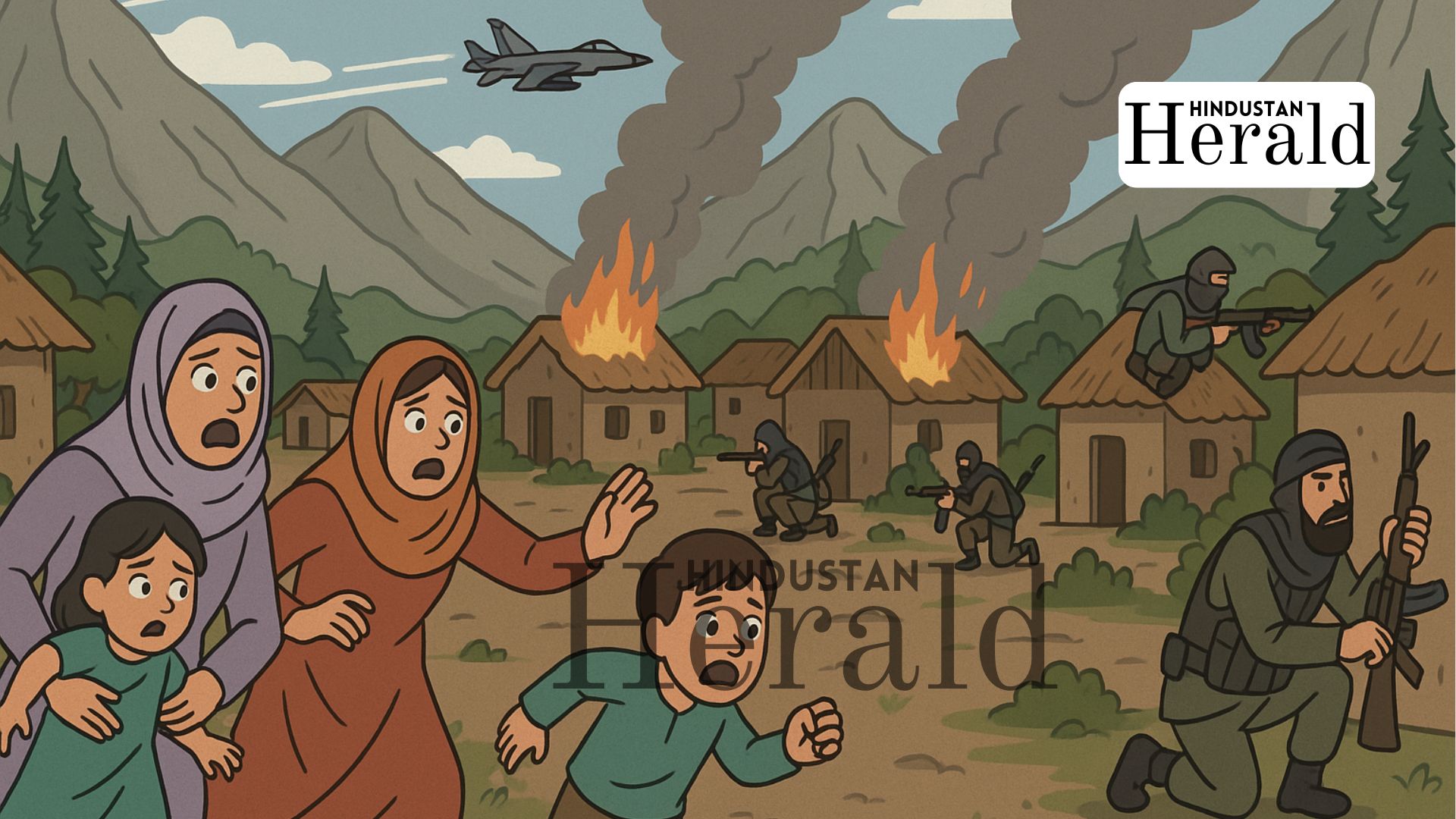Khyber, September 22: The night was supposed to be quiet in Matre Dara, a remote village tucked into the rugged folds of the Tirah Valley in Khyber district. Instead, just after 2 a.m., the sound of fighter jets roared through the sky. Within minutes, the village was flattened by a series of bombs. By sunrise, the death toll had crossed 30 people, including women, children, and entire families crushed under their own homes.
Pakistan’s military says the strike was aimed at Tehreek-e-Taliban Pakistan (TTP) militants hiding in civilian areas. Locals, digging with bare hands to pull bodies from the rubble, see it differently. For them, it was another night when the war between militants and the state landed directly in their courtyards.
Villagers Buried in the Rubble
According to multiple reports, the Pakistani Air Force dropped at least eight LS-6 precision-guided bombs, a Chinese-made system fitted on Pakistan’s JF-17 Thunder jets, on the village. Officials insist it was a carefully calibrated strike. On the ground, precision is not what people saw.
Homes made of mud and stone collapsed instantly. Survivors said many of the dead were children asleep under blankets. By dawn, bodies were lined up outside the village mosque. Rescue workers struggled to reach everyone, and in some cases, neighbors had to carry the injured on foot to clinics miles away.
A Second Tragedy, Hours Later
As the village tried to count its dead, another explosion ripped through the Tirah Valley. This time it was not jets, but a blast inside what police say was a militant compound used for bomb-making.
The explosion killed at least 24 people, among them 14 fighters and 10 civilians whose homes were too close to the site. Entire walls caved in, leaving families buried. Police say the militants were storing IEDs and chemicals that detonated by accident. But again, it was civilians who paid the price for proximity to a war they never asked to be part of.
The Human Shield Argument
Officials in Islamabad and Peshawar repeat a familiar line: militants deliberately use civilians as shields. They say fighters set up bomb factories in villages, mosques, even schools, knowing the military will be forced to strike.
That justification is being challenged more openly now. Human rights activists and Pashtun community leaders argue that regardless of militant tactics, the state cannot keep shrugging off such high civilian death tolls. “Precision weapons mean nothing if they are dropped on a village,” one rights worker told a local paper.
Echoes of Past Battles
The scenes from Tirah Valley are not new for Pakistan’s northwest. For two decades, the tribal belt has been caught between insurgents and the state. Military campaigns in South Waziristan, North Waziristan, and Bajaur all carried the same cycle: airstrikes, civilian deaths, displacement, resentment, and eventually, militants returning once more.
What makes this latest round different is timing. Since the Afghan Taliban’s return to power in Kabul in 2021, the TTP has found new confidence. Its fighters slip across the border more easily. Its leaders feel protected. And Pakistani officials say the group’s presence inside Khyber Pakhtunkhwa is now stronger than at any point in the last five years.
Why It Matters Beyond Tirah
The bombings also carry international dimensions. The weapons used, Chinese LS-6 guided bombs, underscore Beijing’s role in Pakistan’s air force modernization. If the images of dead children begin circulating widely, Islamabad could face uncomfortable questions from abroad about how those weapons are being used.
There is also the domestic angle. For ordinary Pashtuns, it is another reminder that they remain trapped in a war between militants they never joined and a state that sees their villages as battlefields. Each fresh tragedy risks deepening distrust, creating space for exactly the extremist groups the government wants to weaken.
A Community Caught in the Middle
For now, there is little space for politics in Matre Dara. Villagers are still pulling bodies from under collapsed walls. Families are burying their dead side by side. And children who survived the airstrike and the blast are too frightened to sleep indoors.
The Pakistani state promises that these operations are necessary to secure peace. Militants insist they will not stop fighting. Stuck between them, communities in Khyber Pakhtunkhwa wonder how many more times their homes will have to become part of a battlefield before anyone calls it enough.
Stay ahead with Hindustan Herald — bringing you trusted news, sharp analysis, and stories that matter across Politics, Business, Technology, Sports, Entertainment, Lifestyle, and more.
Connect with us on Facebook, Instagram, X (Twitter), LinkedIn, YouTube, and join our Telegram community @hindustanherald for real-time updates.
Specializes in South Asian geopolitics and global diplomacy, bringing in-depth analysis on international relations.






